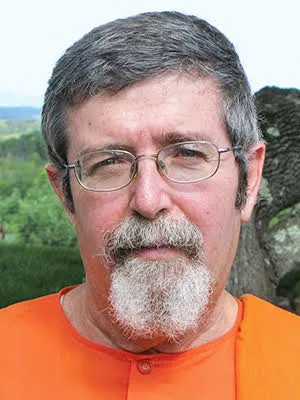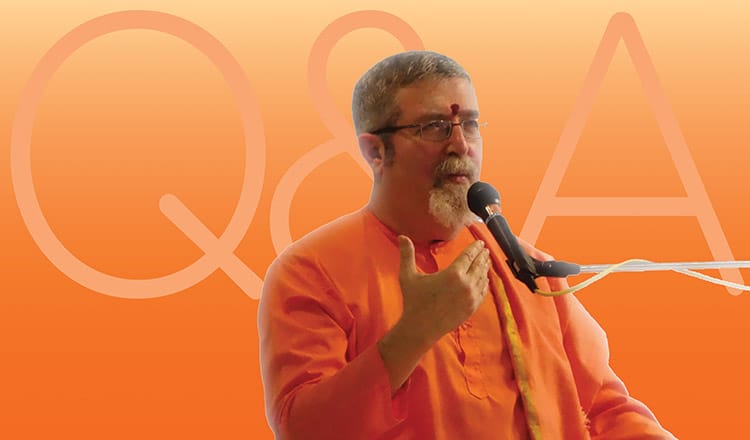Sivananda Bahamas Blog
Expand Your Horizons …
Our Blog
If You Want Peace, You Have to Create a New Movie
Question: What is the best response to world conflict, to interpersonal conflict?
Answer: In the context of the law of karma, I'm going to say something very strong, which is that we are personally responsible for conflict in the world. We always say, "Bush is responsible," or, "Obama is responsible," but this is not true because I am personally responsible for everything that I experience in my world. The world that I experience is mine, and the world that you experience is yours, and there is also something in common.
The meaning of prarabdha karma is that absolutely every single experience of my present life, including war, is the result of my past actions. Within the system of yoga -- and it does not really matter how you look at it, whether it is through yoga or vedanta or sankhya -- the world does not come from outside, it comes from within. It is not that there is a world outside and I am the result of that external world; it's the other way around. It is as if there is a projector within us that is projecting the whole world, which is outside. That projector is the mind, and the film is my prarabdha karma, the world that I experience outside is my prarabdha karma, and the movie runs. So, moment by moment, I see the movie. When the movie ends, my life ends. When the movie starts, my life starts. And everything I experience in this movie is my prarabdha karma, including the wars.
If there was no violence in my past, it would be impossible for me to experience war in the present. Do you see? There is only one cause of war in the present, which is that I myself committed actions of violence in the past. Therefore, in the present, I experience them. Otherwise, it would be impossible to experience them. I must have sown seeds of violence, which ripened to manifest as war. Now this is the holy yogic truth about this: If you want to change the outside, the only way to do it is to change what is within. You have to create a new movie. Then you are going to see a new movie, because this experience is a kind of virtual reality movie. When you put on virtual reality goggles, you see a whole world surrounding you, and different things happening. The world you are experiencing now, this virtual reality world, is projected by your own mind. There is also a group karma which is common, but a lot of it has to do with your own karma.
If you want to experience a different type of world, if you don't want to experience war in the future, you need to change the karmic seeds in the present. You need to generate non-violence, and peacefulness, and love and compassion, and so on. Swami Vishnudevananda was very clear about this -- inner peace for outer peace. You want outer peace? You have to generate it within. Then you are going to experience outer peace. Not just for yourself, but also for others, because my own karma interacts with the karmas of others, and it affects them. We affect each other. We are interconnected. This is another principle of the law of karma: Nobody is just by himself. Everyone is interconnected with everyone else. Don't think your life is an isolated event, because it affects all other lives. It is a kind of net of interconnectedness. We need to understand this, but basically speaking, what I experience outside is my own prarabdha karma, even my dreams at night.
The only way to change things is to change the movie. I need to have a different type of movie, and to have a different type of movie, I have to sow different seeds. I am a city person, not a farmer, but I think that in order to get tomatoes, you have to sow tomato seeds. In order to get cucumbers, I assume you have to sow cucumber seeds. You cannot sow seeds of tomatoes and harvest cucumbers, and vice versa. Similarly, you cannot sow seeds of violence and hope that in the future you are going to experience external peace. This is not going to happen. If you sow violence, you are going to reap violence in the form of experience.
We live in a world where it is our own doing if we experience violence. The only way to change this is to change it within ourselves, and there is no better method to do it than meditation. Real meditation takes care of the whole thing, because it generates inner peace, and inner peace will generate external peace.
Understand that the path of meditation doesn't mean that we just sit and close our eyes. This is not the path of meditation. The path of meditation consists of karma yoga, bhakti yoga, raja yoga, and so on. Understand that the foundation of Raja Yoga is ahimsa, non-violence, which is a practice. Mahatma Gandhi is a good example of a person who practiced non-violence successfully. He actually practiced ahimsa. He practiced satya, or truth. He practiced brahmacharya, or control of the senses. By doing these practices he managed to change the situation in India, and also affected the whole world. You can see, these are real things, and it becomes clear that if we want to deal with the external situation, there is no other way than to change our own destiny, our own karma, by sowing different types of seeds within our subtle mind.
How do we sow seeds? We sow them by our actions -- by what we think, by what we say, by what we do. These need to change, and this is the yogic method to change external reality. We must change our own prarabdha karma. This is how we do it, and this is going to affect everyone, every single person.
Swamiji explained to us: "You cannot give to others what you do not yourself possess." If you do not possess peace, you cannot give peace to other people. You yourself must have it first, right? I cannot give people candy if I do not have candy. First I have to get candy, then I can distribute it. Similarly, I cannot bestow peace upon others if I myself don't have peace. Now, if I have peace, where do I have it? Do I have it in my bank? Do I have it in my cup? If I do possess peace, where do I store it? What do you think? I store it within my own mind. I store it within my own heart. This is where peace can be found. Then I can share it with others, and there is no better method to invoke peace, to invoke inner peace, than meditation. Meditation is the ultimate method to do it. Therefore, in yoga, we always recommend to all people, "Please learn how to meditate, because this is the way to peace."

Swami Swaroopananda is a senior disciple of Swami Vishnudevananda. A practicing yogi from a very young age, Swami Swaroopananda has dedicated his life to the practice and teaching of yoga. He taught in Yoga Teacher Training Courses around the world and is currently teaching advanced yoga philosophy courses and lectures internationally. He is Director of the Sivananda Ashram Yoga Retreat and acharya (spiritual director) for the Sivananda centers and ashrams in the Bahamas and the Middle East. He is a member of the Board of Directors of the International Sivananda Yoga Vedanta Centres.
Upcoming Courses
Enjoy a delicious vegetarian feast, a reading of the Haggadah, Passover chants, and teachings on Passover’s relationship to yogic principles.
In honor of the Sivananda lineage and Swami Swaroopananda's birthday, we invite all guests, friends, and residents of the ashram to come together for a celebration.
During this special time of year we invite you to join us in celebrating wisdom, love, compassion, and the transcendence of artificial barriers.








